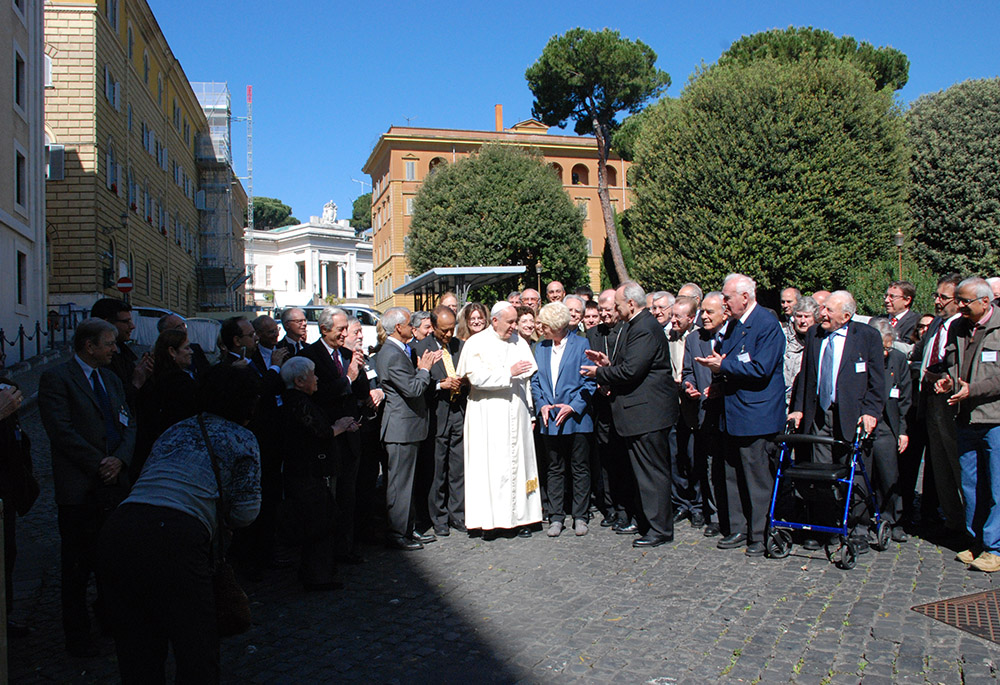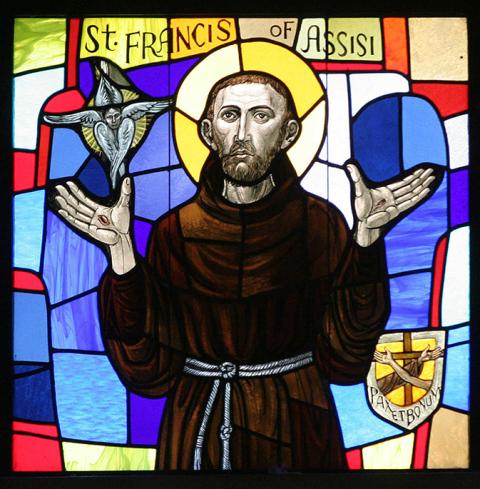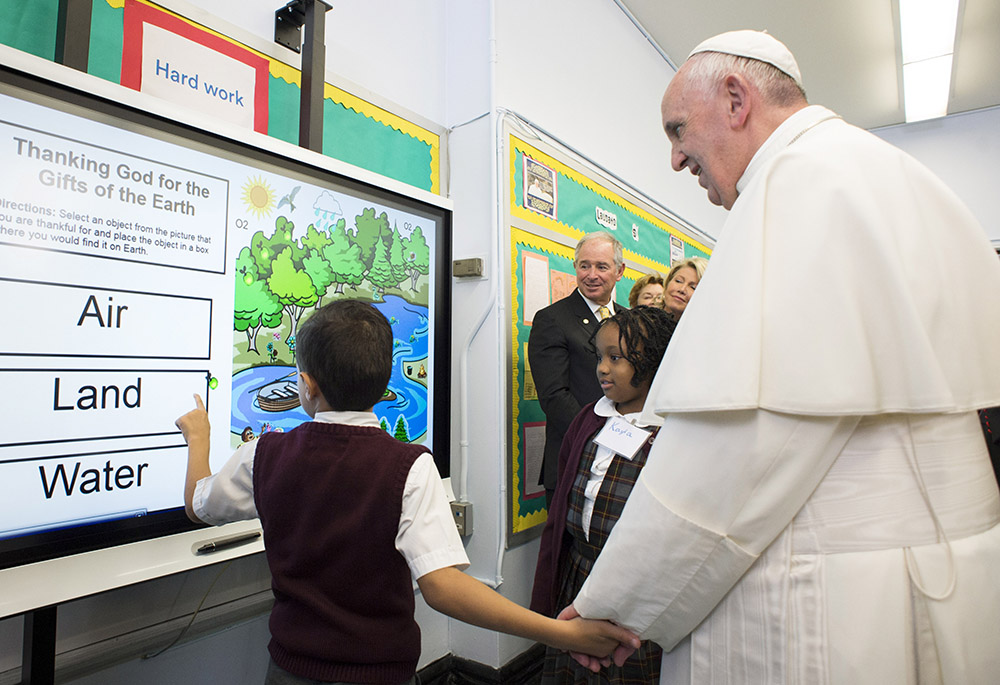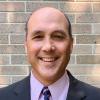
Pope Francis stands outside of Casa Santa Marta with attendees of a Pontifical Academy of Sciences meeting on the environment and climate change, in May 2014. Dan Misleh's head appears above the woman in the blue blazer to the right of Francis. (Courtesy of Dan Misleh)
"That is totally photoshopped," said my family members. Indeed, it did look that way. My head was the only thing you could see above a crowd of people gathered around Pope Francis at the Vatican in May 2014 for a Pontifical Academy of Sciences meeting on the environment and climate change.
As executive director of the Catholic Climate Covenant, I had been invited to be an observer by the head of the academy, Bishop Marcelo Sánchez Sorondo. On the final day of the conference, Pope Francis paid us a visit.
As we waited outside Casa Santa Marta, a small blue car pulled up. His Holiness opened the back door and greeted us with his signature smile and wave! After conversations with the leaders of the conference and some handshakes, we lined up for a picture. At 6-foot-3, I found a place in the back and the camera only captured my head.

St. Francis of Assisi is depicted in a stained-glass window at St. Hyacinth Church in Glen Head, New York. (CNS/Gregory A. Shemitz)
Since 2006 when Catholic Climate Covenant was founded, the only significant statement on the environment had come in 2010 with Pope Benedict's World Day of Peace message. I never imagined at that time that there would be a full encyclical letter on the environment. However, when a pope had the audacity to name himself after St. Francis — a man of peace, simplicity and creation — I began to dream then of an environmental encyclical.
A year after that group photo was taken, Pope Francis would issue in June 2015 "Laudato Si', on Care for Our Common Home." When the world got wind of the impending encyclical, the commentaries began before anyone knew its contents: "What business does the pope have weighing in on an issue that has nothing to do with our faith?" and "He should focus on saving souls, not on some political agenda." Others (like myself) were thrilled.
For many, Pope Francis was an instant hit, eschewing many of the trappings of the papacy and embracing mercy, encounter, openness, care for the poorest of the poor, and heartbreak for migrants fleeing war, oppression and climate impacts. These were the early hallmarks of a remarkable papacy. Then came the encyclical on creation care. I wondered if his global popularity would carry over to an embrace of this needed message.
When Laudato Si' was released, the Catholic Climate Covenant suddenly became a center of activity to promote the document in the U.S., alongside the U.S. Conference of Catholic Bishops. Environmental groups and others proclaimed it as the most significant document ever on the environment and the climate crisis. I couldn't argue otherwise.

A student shows Pope Francis a lesson on the environment during his visit to Our Lady Queen of Angels School in the East Harlem area of New York on Sept. 25, 2015. (CNS photo)
Its style was accessible. It built upon and expanded Catholic teaching and tradition. At times it was hard-hitting, but, Francis being Francis, it also expressed optimism that, together, we can shape a different future. Francis said that while humanity has allowed itself to create "an immense pile of filth," we also have the ability to clean up the mess and "sing" as we do it.
But some felt Laudato Si' was too critical of the enormous gains in human well-being brought about by abundant, relatively accessible and portable, and easily combustible fossil fuels. Those opposed to or skeptical about a wholesale move to renewable energy cited the costs, the social disruptions, and that these new technologies would be unavailable to low-income countries. The harshest critics claimed that the pope was a "Gaia" worshiper, unmoored from tradition.
In the face of accelerating climate impacts, especially on the poor, none of these arguments are persuasive. Pope Francis, and all those scientists at the Vatican in 2014, knew this.
For me, the core of Francis' argument to be better caretakers of our common home is integral ecology. As he said in Laudato Si', "We are faced not with two separate crises, one environmental and the other social, but rather with one complex crisis which is both social and environmental." He said there are three interrelated relationships that must be attended to within integral ecology: our relationship with God, with one another, and with the Earth. If we neglect any one of those relationships, the other two suffer.
Advertisement
He quotes Benedict, who during his inauguration Mass said, "The external deserts in the world are growing, because the internal deserts have become so vast." In other words, we are not tending to our relationship with God. If we were, we would see that we must limit our consumption so the deserts of the world stop expanding.
Despite heroic efforts by many who were captured by his powerful encyclical, still not enough has been done to save our common home and common future. Eight years after Laudato Si', Francis expressed his frustration through the apostolic exhortation Laudate Deum. He opened this powerful lament on the lack of climate progress by citing the excellent 2019 U.S. bishops' statement on climate change, and closed the piece noting that the U.S. is the largest contributor to greenhouse gas emissions. He implored us to simplify our lives.
We cannot ignore this crisis. We don't need to exaggerate weather-related disasters to grasp their severity. They are as real as thousands of homes destroyed by fire in Los Angeles or a flooded western North Carolina. Without emotion, the relentless heat withers crops in the fields, the atmospheric rivers produce floods that scour hillsides and homes.
As economies buckle under the weight of disasters, humanity will look back on 2015 and realize that Francis was right: we paid too little attention to our neighbors, our Earth and our God.
Through Francis, I pray we wake up and recognize that the home we are destroying will destroy us.
Thank you, Pope Francis, for your vision and your leadership. May we be worthy of your message.







